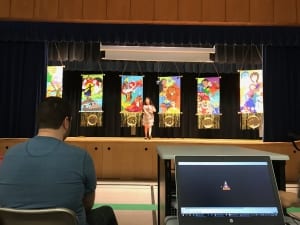Communication, Relevance, and Power in Montaigne’s Essais: Highly relevant PhD thesis by Marina Webster Perkins
Many years ago, I was working as a teacher with the now defunct Metro Toronto School Board (MTSB). I later moved on to the Toronto District School Board (TDSB) and Peel District School Board (PDSB) before I retired in 2006. At the latter board, I taught at Munden Park Public School.

One of several dance performances at 50th Anniversary event at Munden Park Public School in Mississauga, June 15, 2019. Jaan Pill photo
At the MTSB in the early 1980s, I worked with another teacher to write a curriculum document for fellow teachers. The document offered advice about how to be effective in helping students acquire language – in the case of students not yet using language in order to communicate.
In working on the document, I read an article about what researchers had discovered, up until the 1980s, regarding how infants acquire language. In reading the article, I came across my first-ever exposure to the concept of pragmatics. The article noted that when we consider the pragmatics of conversation, it’s a great idea to think of a conversation as similar to a tennis match. The ball gets hit across the net by one conversational partner, and in order for the conversation to continue, the other conversational partner has to hit the ball back over the net.
That was a powerful concept for me to learn. I didn’t learn of it sitting in a classroom in university. I came across it while working on a writing project.
In several decades of volunteer work starting in the late 1980s, I consistently applied the concept – the metaphor of the ball being hit back and forth across the net – in all of my work in a realm which can be termed community self-organizing. Sometime, it’s good to keep the tennis match going, and sometimes it makes sense to let it come to an ending – by not returning the tennis ball that has been hit across the net.
A strategic awareness of the concept is inseparable, in my mind, from the power dynamics involved with communicative acts in all aspects of life. A related topic concerns research about language socialization.
Communication can be used for good ends or for ill. Community self-organizing can be performed for good ends or for ill.
I’ve been most interested to learn, from an online PhD thesis, Communication, Relevance, and Power in Montaigne’s Essais by Marina Webster Perkins, that the tennis-ball metaphor goes back a long ways in history.
The above-noted thesis also discusses relevance theory, as well as concepts introduced years ago by Erving Goffman. In the event relevance theory, the work of Erving Goffman, and related matters may be of interest to you, I highly recommend the reading of this thesis.
As well, an overview of Montaigne is available in a study by Sarah Bakewell entitled: How To Live: A Life Of Montaigne (2011).


Leave a Reply
Want to join the discussion?Feel free to contribute!